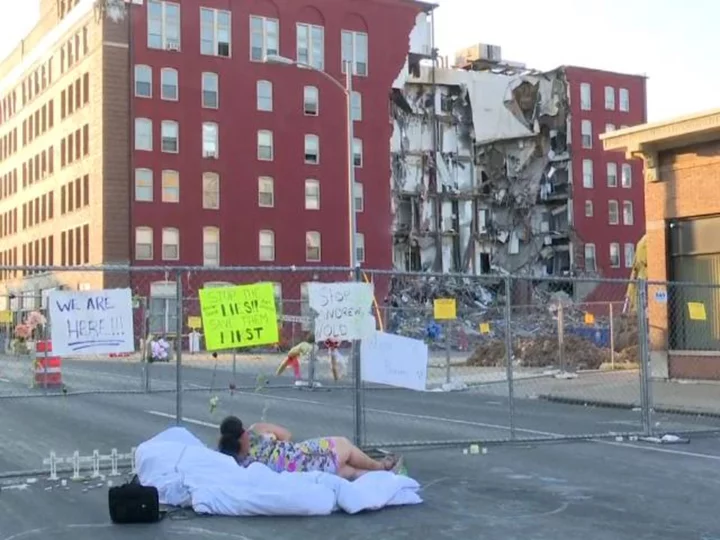
3 people are missing days after apartments collapsed. Now officials have changed demolition plans for the dangerous, 'shifting' building
Two people previously unaccounted for after the partial collapse of an Iowa apartment building Sunday have been found safe, Davenport police said Thursday. But three others -- including at least two who lived in the crash zone -- remain missing.
2023-06-02 02:48

Senate passes bill to block Biden's student loan forgiveness program
Both the Senate and the House have now passed a bill to block President Joe Biden's student loan forgiveness program, which promises to cancel up to $20,000 of debt for millions of borrowers but has been held up by courts.
2023-06-02 02:45
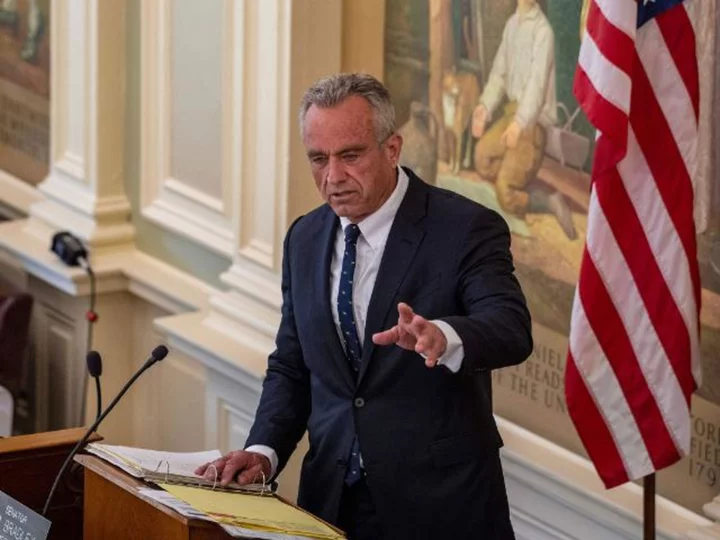
Robert F. Kennedy Jr. emphasizes the importance of a democratic election and hits DNC in speech to New Hampshire Senate
Robert F. Kennedy Jr., the environmental lawyer and anti-vaccine activist who launched his 2024 presidential bid earlier this year, discussed the importance of a democratic election and critiqued the Democratic National Committee over the push to change the presidential nominating calendar in a Thursday address to the New Hampshire Senate.
2023-06-02 02:23
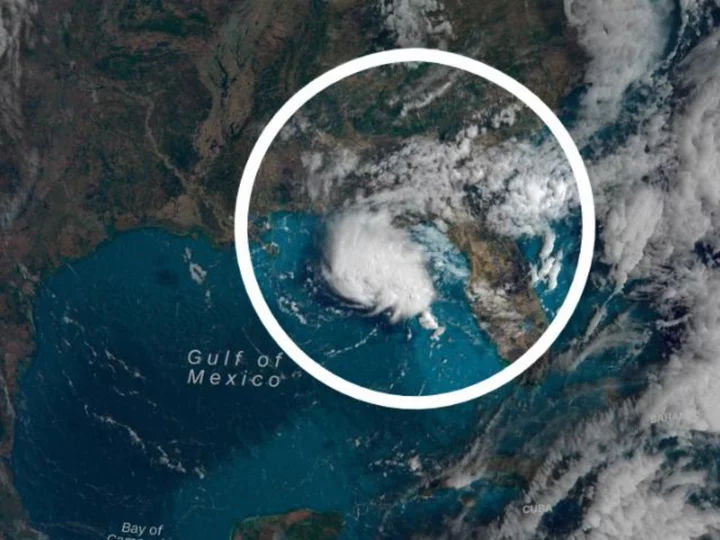
It's the first day of hurricane season and we could have a storm in the Gulf very soon
Today is the first official day of the Atlantic hurricane season and it's already off to an active start.
2023-06-02 02:17
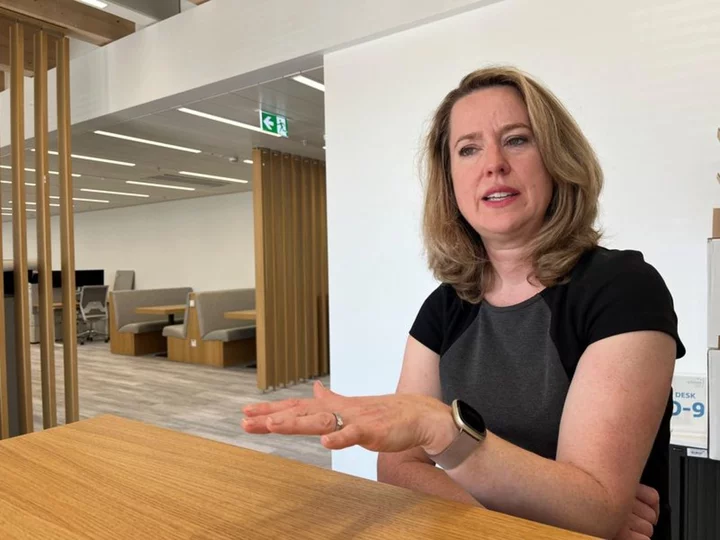
Companies like Microsoft can help manage migration: incoming UN migration chief
By Emma Farge GENEVA The incoming head of the U.N. migration agency said on Thursday that she has
2023-06-02 01:56
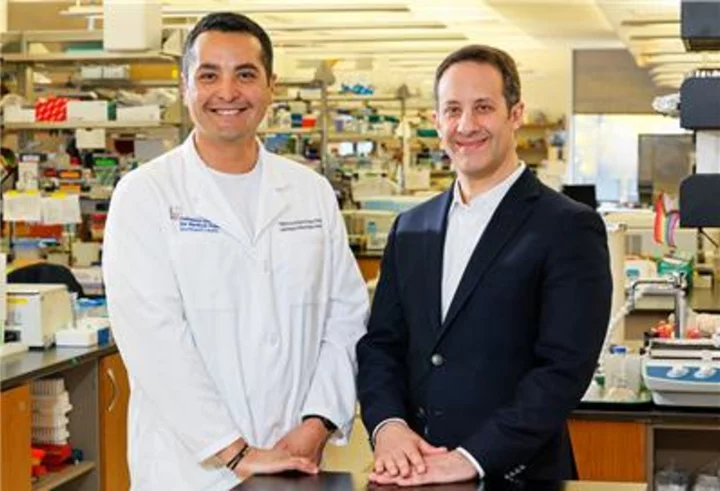
Feinstein Institutes bioelectronic medicine researchers stimulate vagus nerve to reduce bleeding in hemophilia
MANHASSET, N.Y.--(BUSINESS WIRE)--Jun 1, 2023--
2023-06-02 01:52
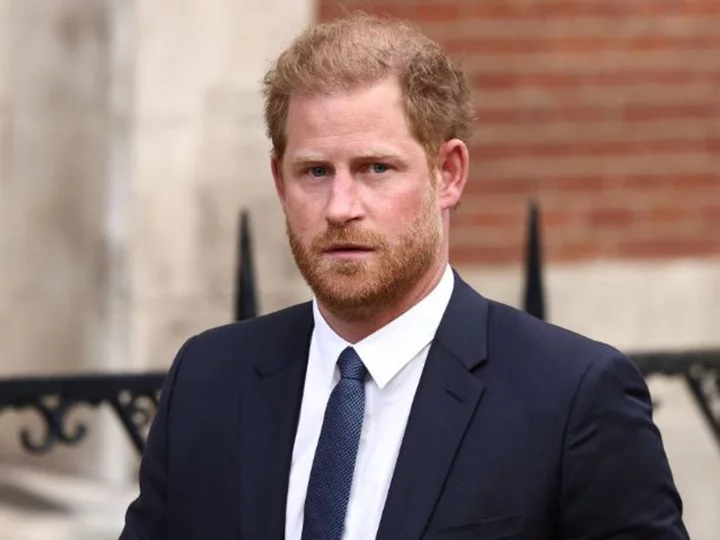
US court to hear challenge over Prince Harry's visa following drug revelations
Prince Harry's US immigration records should be unsealed in the light of revelations about drug-taking in his recent book, a conservative think tank will argue in a federal court next week.
2023-06-02 01:51
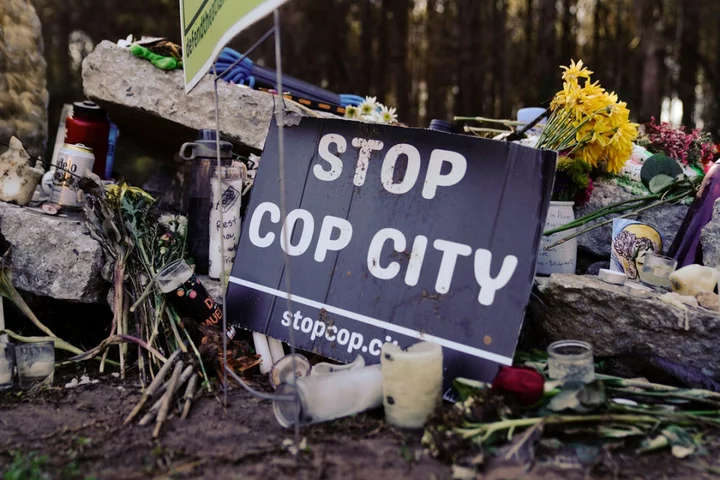
Arrest of ‘Stop Cop City’ bail fund organisers is ‘alarming escalation’ of police retaliation, activists warn
Atlanta police have arrested three organisers behind a nonprofit group that provides bail and legal support to arrested protesters involved with a monthslong campaign against a sprawling, multi-million dollar law enforcement complex. Marlon Kautz, Adele Maclean and Savannah Patterson – all board members with the Atlanta Solidarity Fund – were charged with one count each of money laundering and charity fraud on 31 May. If convicted on money laundering charges, the organisers could face up to 20 years imprisonment and tens of thousands of dollars in fines. Bail fund organisers and civil rights groups have warned that the arrests mark a rapid and unconstitutional escalation of law enforcement retaliation against demonstrators involved with the “Stop Cop City” movement. Atlanta activists also fear that prosecutors are planning to indict those arrested in connection with the protests as a “criminal organisation” under Georgia’s sweeping state-level statute that has been used to target organised crime. Lauren Regan, executive director of the Civil Liberties Defense Center, called the arrests an “extreme provocation” from Atlanta Police Department and state prosecutors. “Bailing out protestors who exercise their constitutionally protected rights is simply not a crime,” she said in a statement. “In fact, it is a historically grounded tradition in the very same social and political movements that the city of Atlanta prides itself on. Someone had to bail out civil rights activists in the [1960s] – I think we can all agree that community support isn’t a crime.” The Atlanta Public Safety Training Center project has been at the centre of “Stop Cop City” protests and occupations since its proposal in 2021, expected to occupy 85 acres in a historically and environmentally significant forest area owned by the city of Atlanta. The police training facility in the South River Forest has drawn widespread opposition from environmental groups and criminal justice reform advocates. Police have arrested dozens of people during protests, including more than 40 people facing “domestic terrorism” charges. The Atlanta Solidarity Fund – among similar organisations across the country that provide bail support and legal aid – has predated the “Stop Cop City” movement and provided grants to a number of groups in the Atlanta area. The fund also has provided legal aid and bail assistance to protesters facing excessively high bonds, with some as high as $300,000. A statement from the Georgia Bureau of Investigation accuses the three arrested organisers with committing “financial crimes”; an arrest warrant for Ms Patterson connects a “money laundering” charge to reimbursements from the nonprofit to a personal PayPal account for expenses including “gasoline, forest clean-up, totes, [Covid-19] rapid tests, media, yard signs and other miscellaneous expenses.” In a statement defending the arrests, Georgia’s Republican Governor Brian Kemp called bail organisers “criminals” who “facilitated and encouraged domestic terrorism”. “As we have said before, we will not rest until we have held accountable every person who has funded, organized, or participated in this violence and intimidation,” Georgia Attorney General Chris Carr said. The arrests of the bail fund organisers on 31 May comes roughly one week after news of the project’s $67m price tag, more than double the $30m projected cost, and days before the Atlanta City Council’s anticipated vote on 5 June on whether to fund the facility. In a written statement prepared in the event of an arrest, Kautz said that criminal charges against the Atlanta Solidarity Fund “will have repercussions on the ability of movements to create change across the country,” a tactic from “a new playbook that criminalizes the coalition of advocates who are providing financial and physical support to movements.” Fair Fight Action, a voting rights organisation founded by Stacey Abrams in 2018, stressed that “legal aid groups and bail funds are, and have long been, critical resources for those seeking to make their voices heard in their communities.” “The timing of the state actions – just one week before a controversial vote – is not a coincidence,” the group said in a statement condemning the arrests. “Bail funds were integral during the Civil Rights Movement, oftentimes serving as the only path to freedom for arrested protesters. The incendiary rhetoric against and criminalization of these institutions by the Kemp administration represents an alarming escalation of tensions in the face of serious community concerns.” Sherilynn Ifill, former president and director counsel of the NAACP’s Legal Defense Fund, said the arrests “demand explanation” from Atlanta Mayor Andre Dickens and Atlanta Police Department chief Darin Schierbaum. “They may wish to recall that targeting the charitable status [and] legitimacy of groups involved in civil rights organizing has a long and ugly history in the South,” she said. “This is dangerous stuff. It is anti-democratic and menacing to organizing and protest – core protected activity in a democracy.” State Senator Josh McLaurin lambasted Mr Carr for what he called an “attempt to score cheap political points by being reckless with people’s lives.” “This empty, 1990s-style tough-on-crime bull**** is tired and dangerous,” he said. Georgia state Rep Saira Draper, whose district includes the area where the arrests were made, said she is “deeply concerned” about the case and the “grossly excessive” use of a SWAT team and helicopters to make the arrests. “What I do know is weaponizing the powers of the state for political gain is abuse of power,” she said. Atlanta City Councilmember Liliana Bakhtiari also said the case deserves “the utmost scrutiny and sensitivity as it moves through the legal process.” Read More Marjorie Taylor Green falsely claims slain Georgia activist killed police officer at Cop City protest Autopsy strengthens case that ‘Cop City’ activist didn’t fire first before being gunned down by police
2023-06-02 01:49
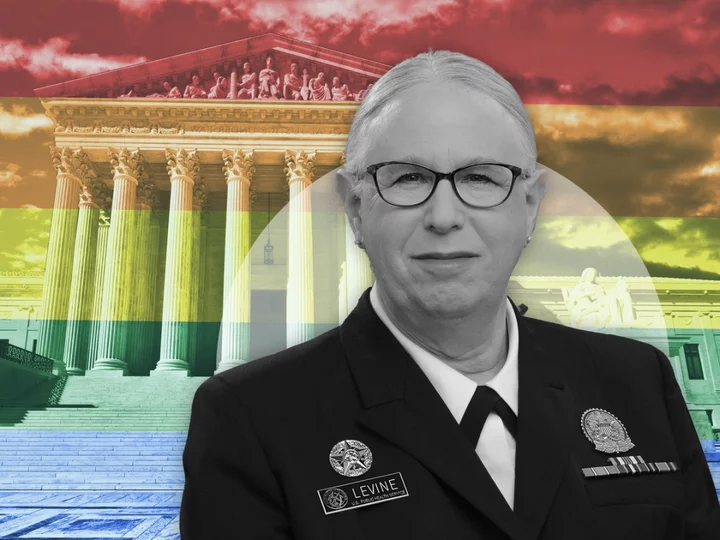
Rachel Levine on Congress bigots, Don’t Say Gay and life as Biden’s top trans official: ‘Despair doesn’t motivate change’
"I'm not the best person for hobbies," says Dr Rachel Levine. In her 40 years of practicing medicine, four of which were spent running the health department of the state of Pennsylvania, she has rarely had much time for recreation. Now she is not only the assistant secretary of state for health for the whole United States under president Joe Biden, but also the most senior openly transgender government official in American history. More than that, she has taken a strong line supporting trans children and transition healthcare at a time when they are under unprecedented attack. According to the non-profit Human Rights Campaign, 19 states have banned transition healthcare for under-18s, and eight more are considering doing so. Meanwhile, medics and patients – including at Boston Children's Hospital, which established the nation's first trans health programme for children and adolescents in 2007 – have received a storm of harassment and threats. "I know the people who developed that clinic. I know them all personally," says Levine, 65, who grew up in Massachusetts and still speaks with a touch of New England in her accent. "I remember when that clinic was formed... now it's under siege by people with political and ideological motivations. "So we need to support trans youth, we need to support their families and we need to support these expert providers that are providing this careful, intentional care according to well-established evidence-based standards." Levine is speaking to The Independent via Zoom from her office in Bethesda, Maryland, flanked by flags, her white hair tied tightly behind her head. As a four-star admiral in the US Public Health Service Commissioned Corps, she wears military-style blue overalls modeled on those of the US Navy and Coast Guard. She does not, she explains, consider herself to be a politician. She has never run for or been elected to office. Instead she sees herself as simply a doctor and a public servant, who now has a rare ability to advocate for her community, as well as overseeing public health areas raging from abortion rights through long Covid to the unequal impact of pollution and natural disasters. But politician or not, her identity has made her a lightning rod for criticism and, sometimes, viotriolic bigotry from anti-trans conservatives. Her name is a fixture in online extremist spaces, where her appointment is painted as part of a conspiracy to overturn traditional gender roles. "When I receive that pushback, I sublimate it," she says, using the psychological term for turning a negative mental energy towards useful ends. "I am a positive and optimistic person because I choose to be positive and optimistic. I can be pessimistic and in despair, but that doesn't motivate change." ‘Trans healthcare is medicine like any other’ Born in 1957, Levine attended an all-boy's school near Boston and studied medicine at Harvard and Tulane University, before completing her training at a hospital in New York City where she specialised in paediatrics and psychology. In 1993, in what she has called her wryly called "most difficult transition", she moved southwest to become a professor at the Penn State, a position she still holds today. In 2015, however, her life took a different turn when Pennsylvania's incoming Democratic governor Tom Wolf asked her to co-chair his health policy transition team and then to be his physician general – a job that would put her right in the merciless gaze of national politics and media. Four years earlier, after decades of "compartmentalising" her feelings, Levine had come out as a trans woman in her fifties. Yet although the backlash against trans rights was already in the offing, her appointment was unanimously confirmed by the state legislature, later becoming Pennsylvania's health secretary and leading its response to Covid-19. Her US Senate confirmation hearing in 2021 was another matter. Republican senator Rand Paul asked her whether children were capable of consenting to medical transition, falsely describing sex reassignment surgery as "genital mutilation". All 50 Democrats and two Republicans voted to confirm her, while the other 48 Republicans voted against. "My confirmation hearing was – interesting," says Levine now, with only the shortest pause, "but not unexpected, and so I was able to navigate that." She adds that although she doesn't deal frequently with Congress, most politicos have treated her "respectfully". As a paediatrician, Levine argues that treatments such as puberty blocking drugs and hormone replacement therapy (HRT) for under-18s should be treated just any other childhood medicine. (Breast removal surgery is rarely prescribed for trans teenagers, and never for younger children, while genital surgery for under-18s is almost unheard of). "Transgender care for youth is medical care; it is mental health care; it is literally suicide prevention care," says Levine. "And it is based upon a well-established standard of care which continually gets updated, as all standards of care do... "It always needs to be done carefully, usually with national or international standards, and then it's individualised to the patient and the family. That's how we do paediatric care. It is no different for transgender medicine." One supportive adult can make the difference Critics of medical transition sometimes liken gender dysphoria – that is, feelings of discomfort or horror related to one's gender – to eating disorders, arguing that both involve an irrational aversion to one's natural body. Levine, who is an expert on eating disorders, pooh-poohs that idea, saying the causes of and solutions to each condition are completely different. Although young trans people do have worse mental health on average than the US population, she says evidence shows that is not caused by being trans but by the way they are being treated by others – a problem exacerbated by anti-trans laws and rhetoric. "Young people who receive support and standard of care treatment have excellent mental health outcomes," she says. "They have depression and anxiety because they're being harassed and bullied, and they're not being allowed to transition. If you facilitate them being who they are, their mental health gets better." Nor is there any evidence, she says, for a theory widespread among anti-trans activists: that young people are being falsely persuaded that they are trans by "social contagion" from their peers. She describes an often-touted 2018 paper by medicine professor Lisa Littman, proposing that trans children may be suffering from "rapid onset gender dysphoria" (ROGD), as "flawed". A group of medical organisations including the American Psychological Association and the American Psychiatric has since warned against applying the concept of ROGD in clinical contexts, describing it as based on "unsupported claims" and likely to "stigmatise" trans people. Littman corrected her paper in 2019 after intense criticism of its methods, and the journal that published it issued an apology. "All the evidence really points to better communication and understanding about gender identity among young people, so that they understand who they are and they come out," says Levine. "There's a lexicon, there's a language, there's support. And more parents understand, and there has been more availability of treatment, and there still is availability of treatment." All of those are things Levine herself never had as a child. "I grew up in the Sixties and Seventies," she says. "There was no terminology, there was no internet, there was no Google. And so I did not understand the thoughts and feelings I was having about gender identity." Even though she had supportive adults in her life, she says there was no way to ask them about being trans because the concept was so unknown. "Who are you going to tell? And what would you have said? None of the language was there." Today she frequently touts a study by The Trevor Project, an American LGBT+ support charity, showing that having even one adult in their life who supports their gender identity can meaningfully lower a young trans person's likelihood of attempting suicide. It is why she is so concerned about Florida's so-called "Don't Say Gay" law and other similar laws, which ban teachers from discussing LGBT+ issues in public schools. "That one supportive adult might be a parent or a relative, but it might not," says Levine. "It might be a teacher, or a coach, or guidance counsellor, or someone else in the community that makes that difference... "[Florida's law] makes it so difficult for a young person to be able to talk to, potentially, that teacher or that coach or that guidance counsellor, because that person then has to immediately tell the young person's parents by that state law." While Republican state legislators seek to pass laws that would make it more difficult for trans people to get healthcare, work in education, or exist in public, a few figures have explicitly called for violence. One GOP candidate last year called for supporters of trans rights to be tried and executed for treason, while a conservative pastor said LGBT+ people should be “lined up against the wall and shot in the back of the head”. ‘Most people in the country don’t hate us’ Some trans people and supporters see all this as a potential precursor to genocide, accusing opponents of wanting to "eliminate" trans people from society by making transition all but impossible. Machaela Cavanaugh, a progressive state legislator in Nebraska, told The Independent last month that trans healthcare bans were a form of "extermination". Does Levine agree? "I would not characterise it as that," she says, although she adds: "I understand the feelings of people who say that, given the hateful rhetoric and the laws and actions being taken." There are many people in the public who have been misled, and I think they are able to be educated about the truth Rachel Levine She likewise rejects the more adversarial approach to fighting for LGBT+ rights that is pithily summarised in the slogan "the first Pride parade was a riot". Instead she sees Pride Month as an opportunity for "advocacy" – for trans people to tell their stories and help educate those who do not understand their lives. The reason, she claims, is that true bigots are merely a "vocal minority", part of a coordinated campaign by conservative think tanks and politicians who lost the argument against gay marriage and are now looking for the next "wedge issue" to divide the electorate. "We're probably not going to change their minds," she says. "But then there are many people in the public who have been misled, and I think they are able to be educated about the truth." She cites the trans author Jennifer Finney Boylan, who wrote that "it's impossible to hate anyone whose story you know", as well as the Jedi master Yoda, who intoned: "Fear leads to anger; anger leads to hate; hate leads to suffering." In other words, people fear what they don't understand – and if they understand more about actual trans people rather than the demonic caricatures of anti-trans invective, they won't go down that path. "I think this is a significant setback, which happens on the road to equality and fairness and freedom. We have seen this in many other times," she says. "So I do not think it will stand, and I think the wheel will turn. "But I do freely admit that it is very difficult and very challenging for members of our community... I think that we are strong, and I think that we are resilient, and I think that we are strong." She pauses for a moment. "But I have to tell you, I choose to believe that." Not all LGBT+ activists feel the same way. Some have accused the Biden administration not doing enough to stem the tide of anti-trans bills, while others have attacked its recent guidance on trans participation in school sports as a surrender to conservatives. Yet Levine is confident that President Biden "supports our community unconditionally", and says there has never been such strong solidarity with LGBT+ people at the top levels of any US government. She cites the President's 13-point executive order last Pride aiming to curb anti-LGBT+ discrimination, the health department's action against conversion therapy, and her work with the Office of Civil Rights to reverse Trump-era changes that weakened rules against discrimination in healthcare. At age 65, she has already seen transgender people go from complete social pariahs, living in the shadows of a society that made no provision for them, to having access to medical transition and at least a chance – sometimes a good chance – of being fulfilled and successful while being open about who they are. So if and when she does have time for hobbies again, what would she do? "I would like to have more time to meditate," she says. "I have meditated in the past and it's pretty hard to add it to my current day, but I have found mindfulness and meditation to be very helpful." Hikes and long walks, too, would be on her agenda. "I used to run," she adds, a little wistfully. "Now I walk." Read More Thousands march in Jerusalem Pride parade, first under Israel's most right-wing government ever LGBT+ flags vandalised for a fourth time at Canada church on eve of Pride Month LGBTQ+ people flock to Florida for Gay Days festival Pride profile: I will be the first asexual grand marshal at NYC’s Pride March Rufus Gifford: The gay man serving as the ‘American welcome’ to foreign leaders Kershaw disagrees with Dodgers’ decision to reinstate gay ‘nun’ group for Pride Night
2023-06-02 01:29
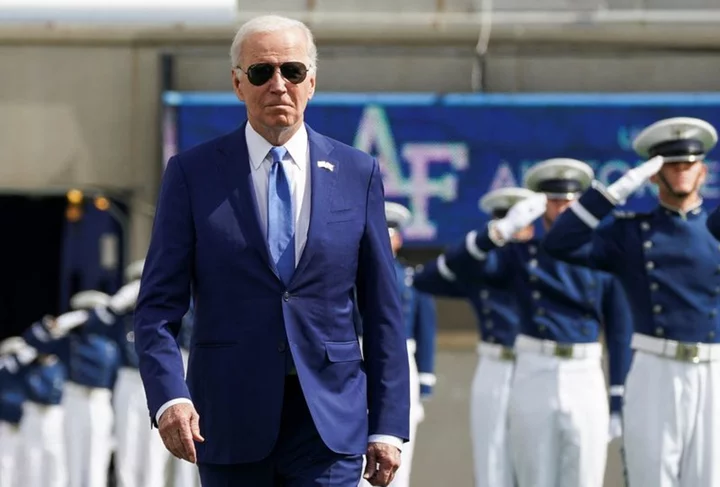
'The world needs you,' Biden tells Air Force graduates
COLORADO SPRINGS U.S. President Joe Biden warned graduates of the Air Force Academy that they will face an
2023-06-02 01:25
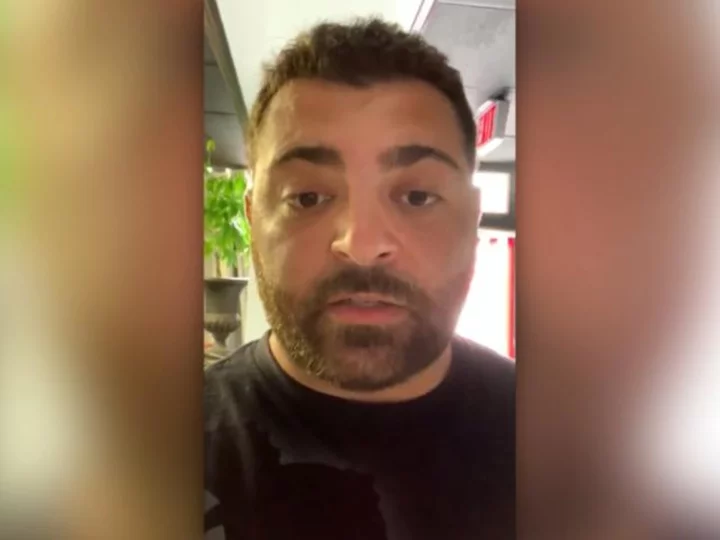
Oath Keepers member who sped to Capitol on a golf cart gets more than four years in prison
An Oath Keeper who acted as part of a security detail on January 6 for Roger Stone before rushing to join the riot at the Capitol was sentenced to more than four years in prison Thursday for seditious conspiracy.
2023-06-02 01:24
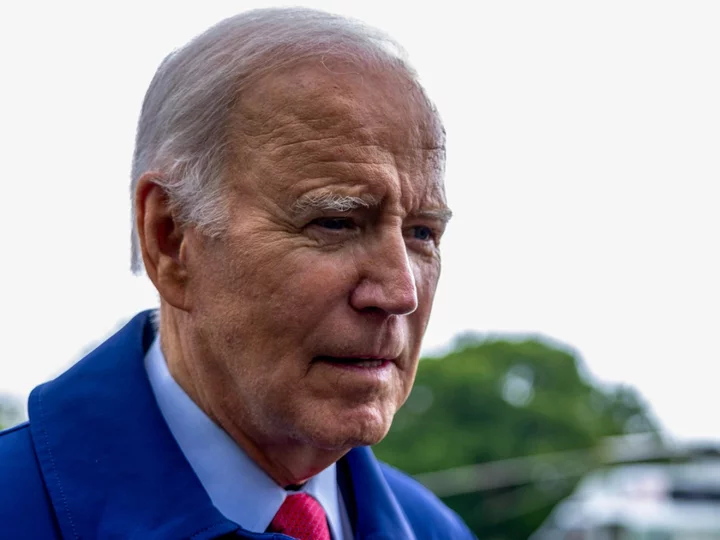
Biden’s troubled journey on LGBT+ rights is a ‘beautiful thing’, top US diplomat says
President Joe Biden’s journey on LGBT+ rights, from supporting restrictions to becoming the first top Democrat to come out in support of gay marriage, has been praised by a top US diplomat as a “very American story” and a “beautiful thing”. Mr Biden joined the chorus of outrage after the passing of Uganda’s draconian anti-gay law, calling for its immediate repeal and threatening sanctions if no action is taken. “The enactment of Uganda’s Anti-Homosexuality Act is a tragic violation of universal human rights—one that is not worthy of the Ugandan people, and one that jeopardizes the prospects of critical economic growth for the entire country,” he said in a statement on Monday. “I join with people around the world — including many in Uganda — in calling for its immediate repeal. No one should have to live in constant fear for their life or being subjected to violence and discrimination. It is wrong.” The bill was signed into law on Monday by Ugandan President Yoweri Museveni. The law includes the death penalty for what’s referred to as “aggravated homosexuality” – meaning those having sex while being HIV positive, those having sex with minors or others considered to be vulnerable. Under the law, an individual found guilty of “attempted aggravated homosexuality” can be sent to prison for 14 years. Mr Museveni sent the law back to the national assembly in April, requesting amendments to clarify the difference between identifying as LGBT+ and taking part in homosexual acts. That prompted pushback from some legislators, who appeared concerned that Mr Museveni would veto the bill as he faced a pressure campaign to do so from abroad. The amended version of the bill was passed early last month. Under a law from the colonial era, homosexuality was already illegal in the East African country as being “against the order of nature”, and with a possible punishment of life behind bars. Mr Biden said that since the new law was introduced, “reports of violence and discrimination targeting Ugandans who are or are perceived to be LGBTQI+ are on the rise. Innocent Ugandans now fear going to hospitals, clinics, or other establishments to receive life-saving medical care lest they be targeted by hateful reprisals”. “Some have been evicted from their homes or fired from their jobs. And the prospect of graver threats — including lengthy prison sentences, violence, abuse — threatens any number of Ugandans who want nothing more than to live their lives in safety and freedom,” he added. “This shameful Act is the latest development in an alarming trend of human rights abuses and corruption in Uganda. The dangers posed by this democratic backsliding are a threat to everyone residing in Uganda, including US government personnel, the staff of our implementing partners, tourists, members of the business community, and others.” Mr Biden said he has asked the National Security Council to review what effect the new law will have on the US relationship with Uganda, including the ability of the US to “safely deliver services under the US President’s Emergency Plan for AIDS Relief (PEPFAR) and other forms of assistance and investments”. The president said his administration is looking at possible sanctions and restricting entry into the US for anyone “involved in serious human rights abuses or corruption”. Mr Biden noted in his statement that “In total, the US government invests nearly $1bn annually in Uganda’s people, business, institutions, and military to advance our common agenda”. As vice president, Mr Biden forced the hand of the Obama administration when he went off-message during a May 2012 TV interview, becoming the highest-ranking Democrat to publicly support gay marriage. Mr Biden’s evolution on gay rights was a long time in the making. As a senator, he voted for the Defense of Marriage Act in 1996, which blocked the federal recognition of same-sex marriages. Earlier in the 1990s, he voted to remove federal funding for schools that taught acceptance of homosexuality. In 1973, he was captured wondering aloud if gay people may be security risks while serving in government or military roles. In an interview with The Independent, the State Department’s Chief of Protocol Rufus Gifford said that the president’s journey on gay rights is a “very American story”. “I think about my own evolution on equality, I think about my parents’ evolution on equality. And it’s a beautiful thing,” the 48-year-old said. The former US ambassador to Denmark describes his current role as “the first handshake and the American welcome for leaders” from around the globe. Mr Gifford advises the president and vice president on diplomatic protocol - and he travels with Mr Biden on all official international trips. Mr Gifford added that the president “opened his heart and mind to new ideas. And isn’t that all we want from our leaders?” “I mean, sure, let’s debate the evolution to a certain extent. But let’s lean into the fact that this evolution is real, it’s meaningful, and it’s actually impacting our lives,” he said. Read More Rachel Levine on Congress bigots, Don’t Say Gay and life as Biden’s top trans official: ‘Despair doesn’t motivate change’ Thousands march in Jerusalem Pride parade, first under Israel's most right-wing government ever LGBT+ flags vandalised for a fourth time at Canada church on eve of Pride Month Pregnant transgender man stars on Glamour UK’s Pride cover in hand-painted suit ‘A second job covered in glitter’: Meet the LGBT+ drag nuns who beat the LA Dodgers
2023-06-02 01:22
